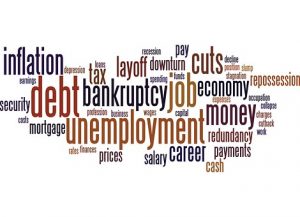Oakland, CA | East Bay, Piedmont; Financial Planning for a Recession
Posted in: Industry News
Is a recession inevitable?
As I write this we’re 3.6% below the last closing high for large U.S. stocks set on July 26th of this year.
Returns for this year are strong, but this is coming off a dramatic sell off at the end of last year. Markets fell almost 20% from early October to December 24th. Toward the end of last year chinks in the armor of the global economy started to reveal themselves. The Chinese economy (2nd largest) has been struggling and the European economy is now essentially at zero growth.
 The media had recently been making a big deal about an imminent recession. Nearly every announcement about a change in trade talks with China pushes markets in one direction or the other.
The media had recently been making a big deal about an imminent recession. Nearly every announcement about a change in trade talks with China pushes markets in one direction or the other.
If you’re watching the show it’s frustrating and normal to want it to all go away.
The U.S. economy is on decent footing. We haven’t had this strong of a labor market since the mid-1960’s. The U.S. consumer (about 70% of our economy), while sometimes expressing negative sentiment in surveys, has in-fact keep spending at a reasonable rate. Unless fear really sets in people will tend to keep living their lives and buying the things they need and want if they can afford them.
The U.S. savings rate is strong (over 7%) relative to what’s it has been over the last few decades and household balance sheets are better than they were before we started the last recession.
Our manufacturing sector is likely now in recession due to trade uncertainty and, should the U.S. consumer decide to curtail spending, our economy would very likely, and possibly very quickly, dip into recession.
We may not officially go into a period of contraction in the U.S. Recessions are generally caused by an imbalance in the system that needs correcting and there’s no such imbalance at this point, at least not one that’s readily apparent. In fact, one could argue that U.S. consumers are still fearful from the last recession and instead of spending excessively they’re spending and borrowing reasonably.
The stock market also doesn’t seem to be particularly inflated at present. After virtually no progress for a few years leading up to 2016, it then went on a tear through 2017. We haven’t had much in the way of gains since then. The stock market is forward looking with respect to prospects for profits and economic progress. With slower to no growth in the other major economies, and trade battles, we’re now in a bit of a wait and see environment. The market obviously isn’t presently counting on terrible things to come in the short term but also not counting on strong growth resuming.
Recessions, however, are positive as they serve to clean the economic system. Players who are too greedy and take too much risk, or are operating on thin ideas, need to be penalized at some point. We want economic progress to be real, solid and sustainable if possible. We’re in the longest growth cycle in our country’s history but that doesn’t mean it has to end soon.
We may get a recession in the coming year, or years, especially if there’s a shock to the system. It’s good to be prepared. We can’t predict the future so money must be managed for the long term, with pockets of safety for clients who need cash in the short term. Cash can also be maintained outside of investment portfolios in case of emergency and one can still get yield in Federally insured accounts above the rate of inflation (despite recent lowering of short-term rates). Credit on home equity or investment portfolios can also be used in case of emergency.
It’s good to have one’s financial house in order in uncertain times.
Return to: Oakland, CA | East Bay, Piedmont; Financial Planning for a Recession
Social Web